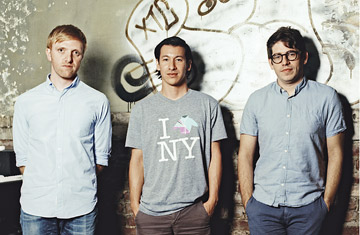
Kickstarter co-founders Charles Adler, Perry Chen and Yancey Strickler.
(5 of 5)
"Crowdfunding does have a role in the investment field," says O'Reilly. "Like if your favorite pizza place wants to open a second location--it's a known business with known cash flow. But to be the equivalent of venture capital, that's just nuts."
Nuts or not, the JOBS Act guarantees that the experiment will happen. "It's going to take a few years to shape and mold this thing into what works well, but you're not putting this cat back in the bag," says David Marlett, founder of a new trade organization called the National Crowdfunding Association.
The fact that Kickstarter intends to sit out any theoretical boom in general-purpose crowdfunding doesn't mean that the site is maxed out. It's certainly easy to envision its participants supporting projects of yet unreached magnitude. Maybe even ones that could make lots of money.
Just ask Dan Harmon, the creator of NBC's Community and an executive producer of Anomalisa. I did, and he began fantasizing about Vince Gilligan, creator of AMC's Breaking Bad.
"If he were to get on Kickstarter and say that he wanted to make a $6 million feature, that he knew the crew and the locations and it was going to star [Breaking Bad lead] Bryan Cranston--of course that $6 million would be generated in 60 days. It only takes people with that kind of street cred, people who have proven themselves not to be snake-oil salesmen, who can give people what they want."
Whatever happens, Kickstarter's founders seem to be comfortable with the tension between their rather specific vision and other possible manifestations of the revolution it's helping unleash. "Maybe Kickstarter looks the same in five years," muses Strickler, "but the rest of the world looks more like Kickstarter." More and more, it already does.
